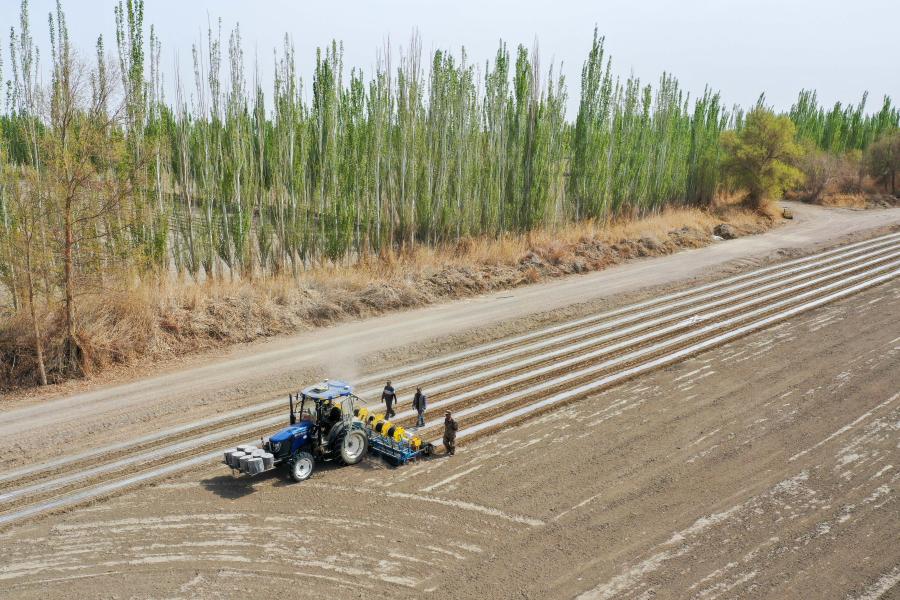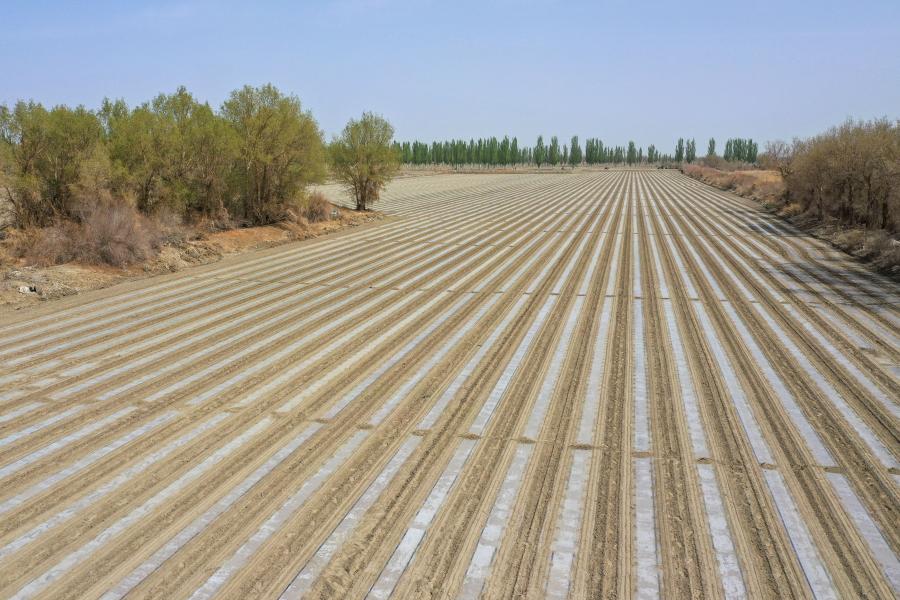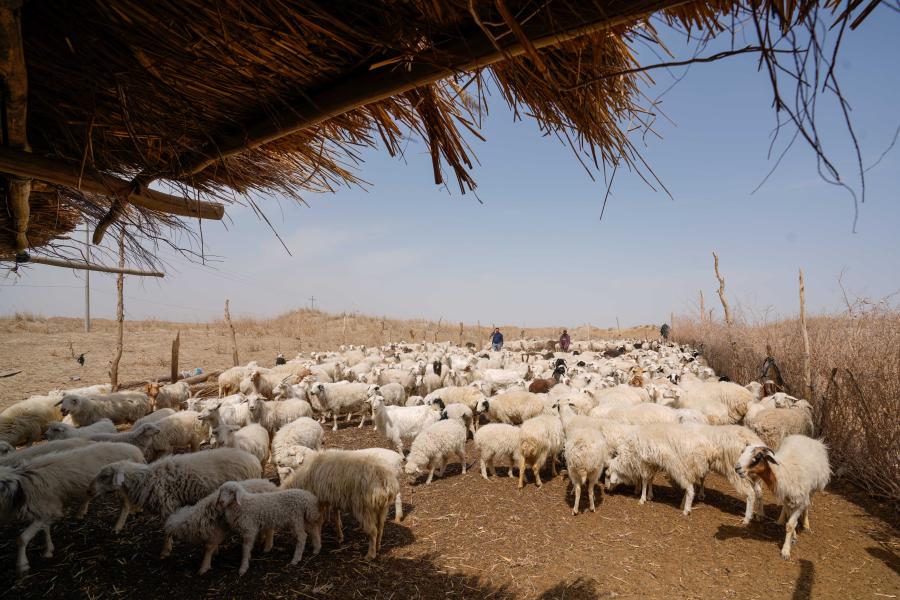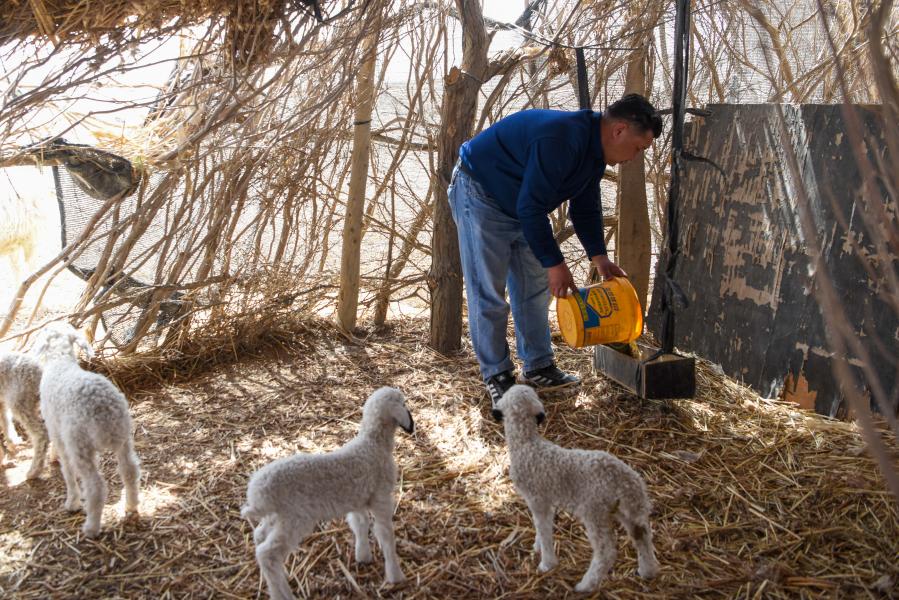
Aerial photo taken on April 13, 2021 shows a film mulching sower at work in a cotton field in Tungqeka Village of Xingping Township, Yuli County, Bayingolin Mongolian Autonomous Prefecture, northwest China's Xinjiang Uygur Autonomous Region. (Xinhua/Ding Lei)
YULI, April 16 (Xinhua) -- When Dilshat Memet graduated from Xinjiang University of Finance and Economics in 2012, he decided to invest in cotton planting in his hometown Yuli County, northwest China's Xinjiang Uygur Autonomous Region. Although there was also a job offer as public servant in a nearby town, the prospects of cotton business sounded more appealing to Dilshat, who now owns a cotton farm with an area of about 66 hectares.

Aerial photo taken on April 13, 2021 shows a cotton field in Tungqeka Village of Xingping Township, Yuli County, Bayingolin Mongolian Autonomous Prefecture, northwest China's Xinjiang Uygur Autonomous Region. (Xinhua/Ding Lei)
Contrary to what some have pictured as a labor-intensive trade, modern cotton production in Xinjiang has largely been mechanized. In Dilshat's case, large cotton harvesters have been put to use since 2017, whereas film mulching seeders were already introduced on cotton fields run by his relatives more than a decade ago. "Now we have even started to use unmanned tractors," said Dilshat. "Technology has slashed a great deal of our cotton planting cost."

A film mulching sower is at work in a cotton field in Tungqeka Village of Xingping Township, Yuli County, Bayingolin Mongolian Autonomous Prefecture, northwest China's Xinjiang Uygur Autonomous Region, April 13, 2021. (Xinhua/Ding Lei)
Yuli County is home to over 66,000 hectares of cotton fields, making it a major production base of premium cotton in China. In recent years, local authorities have provided multiple incentives, including preferential policies and technical services, to encourage mechanized cultivation of cotton.
Mechanization of cotton production freed cotton planters like Dilshat from field work, and allowed them more time for investment alternatives. In 2019, Dilshat and partners started an agricultural company that offers drone spraying and mechanized cotton picking services to other cotton farmers.
Meanwhile, Dilshat is making profit from sheep raising at an animal husbandry cooperative in which he and others have invested.

Photo taken on April 13, 2021 shows sheep raised by cotton farmer Dilshat Memet at an animal husbandry cooperative in Tungqeka Village of Xingping Township, Yuli County, Bayingolin Mongolian Autonomous Prefecture, northwest China's Xinjiang Uygur Autonomous Region. (Xinhua/Zhao Ge)

Cotton farmer Dilshat Memet feeds sheep at an animal husbandry cooperative in Tungqeka Village of Xingping Township, Yuli County, Bayingolin Mongolian Autonomous Prefecture, northwest China's Xinjiang Uygur Autonomous Region, April 13, 2021. (Xinhua/Ding Lei)
Every afternoon, Dilshat will leave the cotton farm on time to pick up his daughter from school. "See? Planting cotton here is nothing different from going to work in an office -- everything has a schedule. I don't regret being a cotton farmer," said Dilshat, taking his daughter by the hand as they headed for home in town.

Aerial photo taken on April 13, 2021 shows a film mulching sower on its way to a cotton field in Tungqeka Village of Xingping Township, Yuli County, Bayingolin Mongolian Autonomous Prefecture, northwest China's Xinjiang Uygur Autonomous Region. (Xinhua/Ding Lei)








